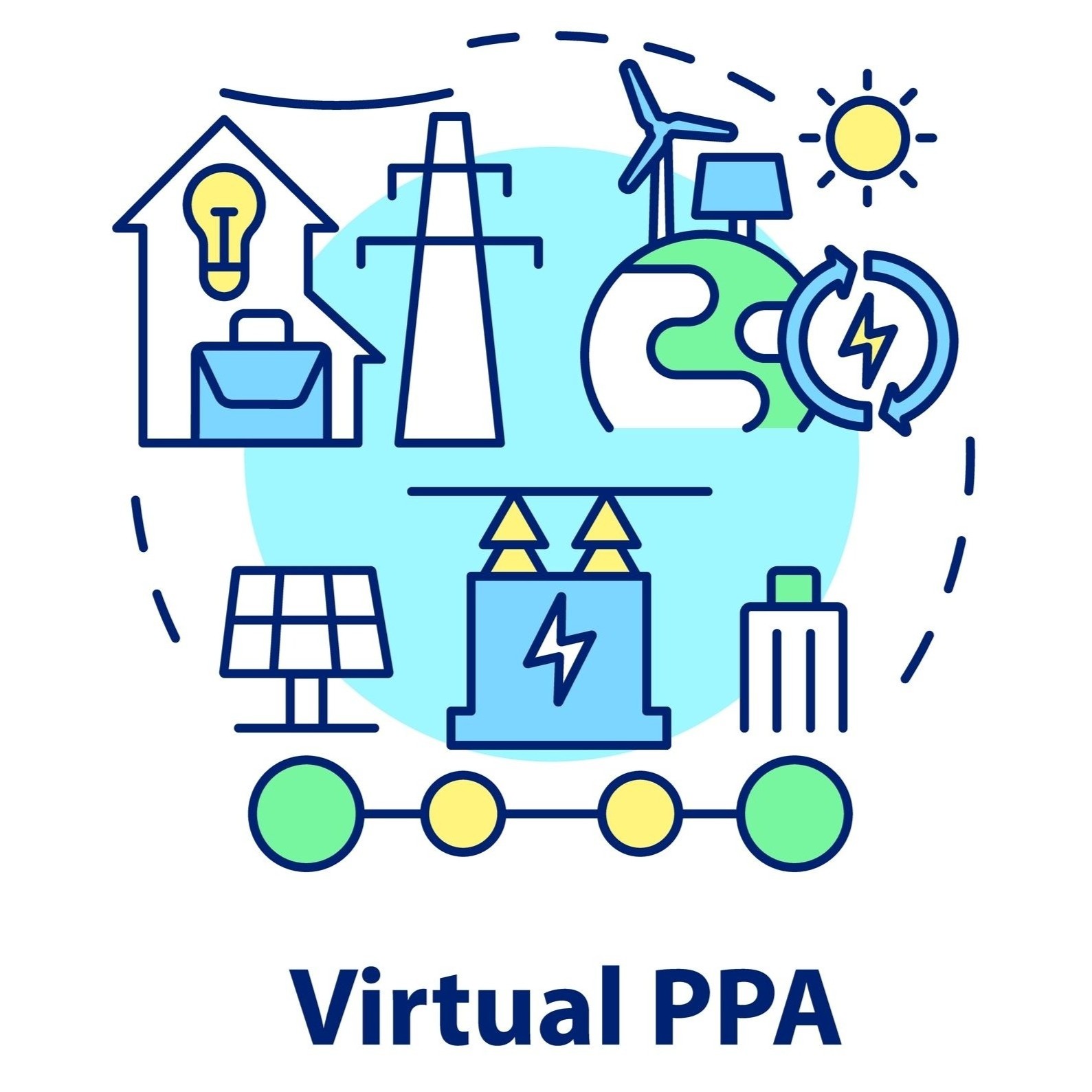As businesses increase their focus on sustainability, they are exploring diverse ways to invest in renewable energy. A Virtual Power Purchase Agreement (VPPA) is an innovative financial tool that allows companies to support clean energy projects without taking direct delivery of electricity. By leveraging VPPAs, businesses can contribute to the development of renewable energy sources while securing financial stability.
This guide delves into what VPPAs are, how they function, and why they are an attractive option for companies striving to achieve their renewable energy and sustainability objectives.
What is a Virtual Power Purchase Agreement (VPPA)?
A VPPA is a contractual agreement between a company (the buyer) and a renewable energy project developer (the seller). Unlike conventional Power Purchase Agreements (PPAs), where companies directly receive the electricity produced, a VPPA is strictly a financial arrangement. The buyer does not take physical delivery of the electricity but instead agrees to a set financial structure that supports renewable energy projects.
In exchange, the company may receive equivalent energy credits and Renewable Energy Certificates (RECs), which verify their investment in clean energy. This setup allows businesses to contribute to the expansion of renewable energy without requiring proximity to the energy project.
 How Do VPPAs Work?
How Do VPPAs Work?
VPPAs function as financial hedges rather than direct energy procurement methods. Below are the fundamental components of how these agreements work:
1. Contract for Differences (CFD):
The structure of a VPPA is based on a Contract for Differences, in which the company commits to a predetermined fixed price (strike price) for the renewable energy generated by the project.
- The renewable energy project feeds electricity into the wholesale energy market at prevailing rates.
- The difference between the wholesale price and the agreed strike price is settled between the developer and the buyer.
2. Financial Settlements:
- If the market price exceeds the strike price, the developer reimburses the buyer for the difference, creating a financial benefit for the company.
- If the market price falls below the strike price, the buyer pays the developer the difference, ensuring financial stability for the renewable project.
3. Renewable Energy Certificates (RECs):
A critical component of VPPAs is the transfer of RECs to the buyer. These certificates verify that one megawatt-hour (MWh) of renewable energy has been generated. Although the buyer does not directly use this electricity, acquiring RECs allows them to claim sustainability benefits and reduce their carbon footprint.
4. Geographic Flexibility:
Because a VPPA does not involve the physical delivery of electricity, businesses can support projects in locations with optimal renewable energy potential. This flexibility allows companies to take advantage of regions with abundant wind or solar resources, increasing the effectiveness and efficiency of their sustainability investments.
Why Companies Choose VPPAs
Organizations opt for VPPAs for a variety of strategic, financial, and sustainability-related reasons.
1. Meeting Sustainability Targets:
With VPPAs, businesses can accelerate their renewable energy commitments by supporting large-scale wind or solar projects. This approach is particularly beneficial for companies with operations across multiple regions, where direct access to clean energy may not be feasible.
2. Stabilizing Energy Costs:
A key advantage of VPPAs is financial predictability. By securing a fixed strike price for energy or RECs, businesses can hedge against market volatility and protect themselves from rising energy costs over time.
3. No On-Site Infrastructure Required:
Unlike direct renewable energy investments, VPPAs eliminate the need for businesses to install, operate, or maintain renewable energy infrastructure, making them a more accessible option for companies without the capacity to develop on-site projects.
4. Enhancing Corporate Reputation:
Consumers, investors, and stakeholders increasingly expect businesses to demonstrate environmental responsibility. A VPPA is a visible and effective way to showcase a company’s commitment to sustainability and corporate social responsibility.
Challenges and Key Considerations
While VPPAs offer significant benefits, businesses must weigh potential challenges before entering into an agreement.
1. Market Price Risks:
Because the financial outcome of a VPPA is tied to fluctuations in wholesale energy prices, businesses must be prepared for potential losses if market prices drop below the strike price.
2. Compliance and Reporting Requirements:
VPPAs involve complex financial and regulatory considerations. Companies must ensure they comply with relevant accounting standards and accurately report their agreements in financial statements.
3. Long-Term Contractual Commitments:
VPPAs typically require contracts spanning 10 to 20 years. Organizations should carefully assess their long-term energy strategies and financial flexibility before committing to a lengthy agreement.
Key Takeaways on VPPAs
Virtual Power Purchase Agreements provide a compelling way for businesses to engage in renewable energy initiatives without physical constraints. By leveraging VPPAs, companies can support sustainability goals, stabilize energy costs, and enhance their corporate social responsibility profile. However, these agreements come with financial considerations and long-term commitments that require thorough evaluation.
As sustainability becomes an increasingly central business priority, VPPAs serve as a powerful tool for companies looking to participate in the clean energy transition. Organizations interested in exploring VPPAs should consult with legal and financial professionals to ensure alignment with their long-term energy and sustainability objectives. By carefully assessing the opportunities and risks, businesses can make informed decisions that benefit both their financial health and environmental impact.
Partner with Avisen Legal for VPPA Guidance
Navigating Virtual Power Purchase Agreements requires strategic planning and legal guidance. Avisen Legal’s experienced team can help your business evaluate VPPA opportunities, mitigate risks, and structure agreements that align with your sustainability and financial goals. Contact us today to discuss how a VPPA can benefit your organization.






